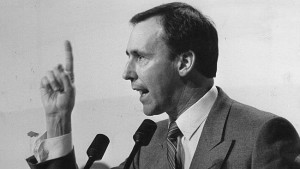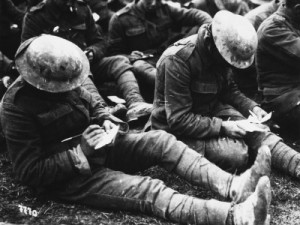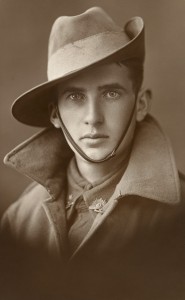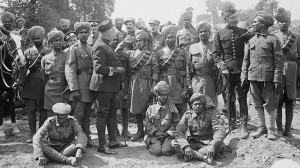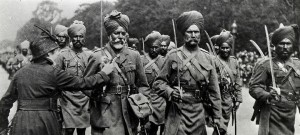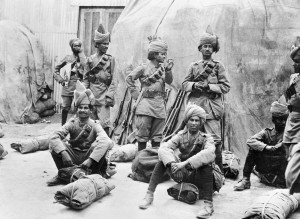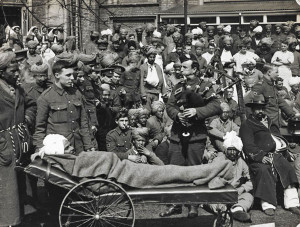Prime Minister Paul Keating’s eulogy to unknown soldier on Remembrance Day in 1993
Below is a transcript of the eulogy delivered by the Prime Minister, The Hon. P.J. Keating MP, at the funeral service of the Unknown Australian Soldier, 11 November 1993.
We do not know this Australian’s name and we never will. We do not know his rank or his battalion. We do not know where he was born, nor precisely how and when he died. We do not know where in Australia he had made his home or when he left it for the battlefields of Europe. We do not know his age or his circumstances ”“ whether he was from the city or the bush; what occupation he left to become a soldier; what religion, if he had a religion; if he was married or single. We do not know who loved him or whom he loved. If he had children we do not know who they are. His family is lost to us as he was lost to them. We will never know who this Australian was.
Writing home letters from trenches
Yet he has always been among those whom we have honoured. We know that he was one of the 45,000 Australians who died on the Western Front. One of the 416,000 Australians who volunteered for service in the First World War. One of the 324,000 Australians who served overseas in that war and one of the 60,000 Australians who died on foreign soil. One of the 100,000 Australians who have died in wars this century.
He is all of them. And he is one of us.
This Australia and the Australia he knew are like foreign countries. The tide of events since he died has been so dramatic, so vast and all-consuming, a world has been created beyond the reach of his imagination.
He may have been one of those who believed that the Great War would be an adventure too grand to miss. He may have felt that he would never live down the shame of not going. But the chances are he went for no other reason than that he believed it was his duty – the duty he owed his country and his King.
Because the Great War was a mad, brutal, awful struggle, distinguished more often than not by military and political incompetence; because the waste of human life was so terrible that some said victory was scarcely discernible from defeat; and because the war which was supposed to end all wars in fact sowed the seeds of a second, even more terrible, war – we might think this Unknown Soldier died in vain.
Indian soldiers in 1915
But, in honouring our war dead, as we always have and as we do today, we declare that this is not true.
For out of the war came a lesson which transcended the horror and tragedy and the inexcusable folly.
It was a lesson about ordinary people ”“ and the lesson was that they were not ordinary.
Sikh soldiers fought gallantly alongside British in WWI
On all sides they were the heroes of that war; not the generals and the politicians but the soldiers and sailors and nurses ”“ those who taught us to endure hardship, to show courage, to be bold as well as resilient, to believe in ourselves, to stick together.
The Unknown Australian Soldier we inter today was one of those who by his deeds proved that real nobility and grandeur belong not to empires and nations but to the people on whom they, in the last resort, always depend.
That is surely at the heart of the ANZAC story, the Australian legend which emerged from the war. It is a legend not of sweeping military victories so much as triumphs against the odds, of courage and ingenuity in adversity. It is a legend of free and independent spirits whose discipline derived less from military formalities and customs than from the bonds of mateship and the demands of necessity.
It is a democratic tradition, the tradition in which Australians have gone to war ever since.
This Unknown Australian is not interred here to glorify war over peace; or to assert a soldier’s character above a civilian’s; or one race or one nation or one religion above another; or men above women; or the war in which he fought and died above any other war; or of one generation above any that has or will come later.
The Unknown Soldier honours the memory of all those men and women who laid down their lives for Australia.
His tomb is a reminder of what we have lost in war and what we have gained.
We have lost more than 100,000 lives, and with them all their love of this country and all their hope and energy.
We have gained a legend: a story of bravery and sacrifice and, with it, a deeper faith in ourselves and our democracy, and a deeper understanding of what it means to be Australian.
It is not too much to hope, therefore, that this Unknown Australian Soldier might continue to serve his country – he might enshrine a nation’s love of peace and remind us that in the sacrifice of the men and women whose names are recorded here there is faith enough for all of us.
The Hon. P.J. Keating MP
Prime Minister of Australia
…………
Thakur Singh
Being wounded in the attack at Neuve Chapelle on October 27, 1914, Thakur Singh would have first been transferred to field hospitals in France before eventually making his way to the newly setup hospitals of Brighton. Thakur Singh would have been one of the early arrivals of wounded Indian soldiers to arrive in Brighton in December 1914 and may have initially been at the Royal Pavilion hospital before being transferred to the Kitchener Hospital. Military records indicate the he rejoined his regiment from England in France on January 11, 1915.
The note on the bayonet reveals that he received treatment at the Kitchener Indian Hospital while in Brighton. While in hospital Thakur Singh would have been afforded all of the respect that a senior officer in the British Indian Army was entitled to including private hospital rooms only shared with other officers, separate facilities for use by officers as well as a dedicated staff. Being a officer, Thakur Singh would also have received visitors and not been subject to as harsh restrictions as those placed on other Indian soldiers visiting the town of Brighton or interacting with the civilian population. During his recovery in Brighton, Thakur Singh would likely have been invited as a honoured guest for tea or dinner at the homes of prominent Brighton personalities and politicians.
Short URL: https://indiandownunder.com.au/?p=4816

